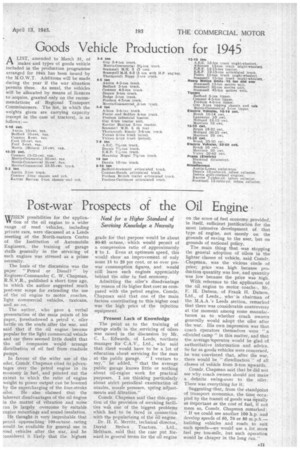Post-war Prospects of the Oil Engine
Page 23

If you've noticed an error in this article please click here to report it so we can fix it.
Need for a Higher Standard of Servicing Knowledge a Necessity W'WHEN possibilities for the application of the oil engine to a wider range of road vehicles, includin., private cars, were discussed at a Leeds meeting of the North-eastern Centre of the Institution of Automobile Engineers, the training of garage staffs generally' in the servicing of such engines was stressed as a prime necessity.
The basis of the discussion was the paper "Petrol or Diesel? " by Engineer-Commander C. W. Chapman, R.N.V.R., published a short time ago, in which the author suggested much post-war scope for extending the use of the oil engine to motor coaches, light commercial vehicles, taxicabs. and so on.
The author, who gave a verbal presentation of the main points of his paper, oreshadowed a petrol v. oiler battle on the roads after the war, and said that if the oil engine became popular for the light commercial vehicle and car there seemed little doubt that the oil companies would arrange distribution of oil fuel from roadside pumps.
In favour of the wider use of the oiler, Comdr.'. Chapman cited its advantages over the petrol engine in its economy in fuel,. and pointed out the extent to which the ratio of engine weight to power output can he lowered by the supercharging of the four-stroke oiler. He also claimed that the inherent disadvantages of the oil engine in the matter of vibration and noise can tie largely overcome by suitable engine mountings and sound insulation.
He thought it very improbable that petrol approaching 100-octane. rating would be available for general use in road vehicles after the war, and he :onsiderecl it likely that the highest grade for that purpose would be about 80-85 octane, which would permit of a compression ratio of approximately 8 to 1. _ Even at optimum speed, this would show. an improvement of only some 15 to 20 per cent, or so over prewar consumption figures, and would still leave such engines appreciably behind the oiler in fuel economy.
Admitting the oiler's disadvantage by reason of its higher first cost as compared with the petrol engine, Comdr. Chapman said that one of the main factors contributing to thigs higher cost was the high price of the injection equipment.
Present Lack of Knowledge The point as to the training of garage staffs in the servicing of oilers was raised in the discussion by Mr. C. L. Edwards, of Leeds, northern manager for C.A.V., Ltd., who said that there would have to be a lot of education about servicing for the man at the public garage. " I venture to say," he added, " that the average public garage knows little or nothing about oil-engine work for practical purposes. I am thinking particularly about strict periodical examination of nozzles, nozzle pressure, spring adjustments and filtration."
Comdr. Chapman said that this..quesbon of the provision of servicing facilities was one of the biggest problems which had to he faced in connection with the popularizing of the Oil engine. Dr. II. E. Merritt, technical director,
David Brciwn Tractors, Ltd., Meltham, said that the case put forward in general terms for the oil engine on the score of fuel economy, provided, in itself, sufficient justification for the
most intensive development of that type of engine, not merely on the grounds of saving to the user, but on grounds of national policy.
The main thing that was stopping the general adoption of oilers in the lighter classes of vehicle, said Comdr.
Chapman, was the vicious circle of price: price was high because pro duction quantity was low, and quantity was low because the price was high. With reference to the application of the oil engine to motor coaches. Mr. F. FL Dutson, of Frank H. Dutson, .
Ltd., of Leeds., who is chairman of the M.A.A.'s Leeds section, remarked that there was considerable controversy at the moment among some manufacturers as to whether coach owners generally would adopt the oiler after the war, His own impression was that coach operators themselves were " a ...divided camp " in this matter, and that the average %operator would be glad of authoritative information and advice. So far as goods vehicles were concerned, he was convinced that, after the war, there would be " dieselizatiod" of all classes of vehicle from 3-ton upwards.
Comdr, Chapman said that he did not see why coach owners should not make a definite swing-over to the oiler. There was everything for it.
Suggesting,that, from the standpoint of transport economics, the time occu
pied by the transit of goods was equally as important as the cost of fuel, if not more so, Comdr. Chapman remarked : " If we could use another 100 h.p. and
develop speeds of 60, 70 or 80 m.p.h.— building vehicles and roads to suit
such speeds—we would use a lot more fuel per ton-rile, but such operation would be cheaper in the long run."




















































